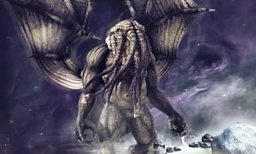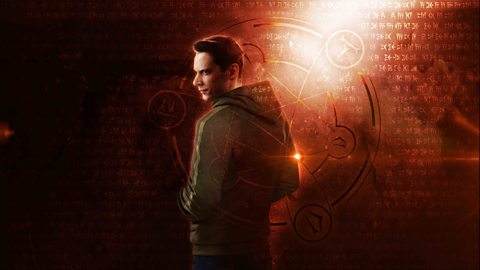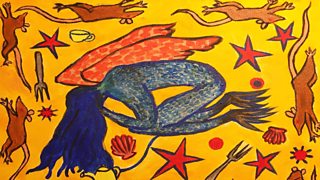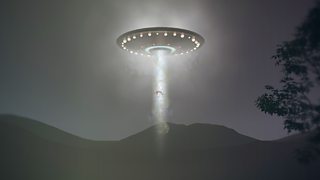Seven surprising ways H.P. Lovecraft influenced our pop culture
As the podcast The Whisperer in Darkness puts a terrifying modern spin on cult author H.P. Lovecraft's classic story, we look at the surprising ways his twisted imagination still affects our lives. He may have died in poverty and relative obscurity in 1937, but Lovecraft's legacy and reputation continues to grow. Various facets of popular culture have adopted his ideas, characters and plot-lines, using them in a variety of surprising ways, from hip hop to video games. Here’s just a few…
-
![]()
Listen to The Whisperer in Darkness
An investigation into witchcraft, the occult and secret government operations.
-
![]()
Listen to Talk To Me
The strangest story of all HP Lovecraft's 'weird tales' isn't fiction at all: it's true.

1. Movie monsters
One Lovecraftian obsession was a slew of demonic, hideous, nightmarish monsters such as the gigantic, intergalactic, be-tentacled monstrosity known as Cthulhu. Lovecraft described the creature as resembling a dragon, an octopus, a mountain and even a human, eventually declaring that "The Thing cannot be described", allowing the reader to use their imagination. This obviously had an effect on horror visionary and artist H.R. Giger, who cites Lovecraft as an influence on his designs for the titular creation in the Alien film series. Cult director John Carpenter also claimed to have used the writer as a source for the creature in his film The Thing, while the demonic visions of Guillermo del Toro can also be traced back to Lovecraft, with his The Shape of Water hat-tipping Lovecraft’s tale of evil fish people The Shadow Over Innsmouth.

2. Speed metal
Lovecraft has had an influence on a variety of musical styles, from the 1960s psychedelic rock band that took his name, to the Arctic Monkeys, who name-checked the author in their song You're So Dark. But the genre that has taken to Lovecraft most fervently is those long-haired lovers of heavy metal and its various offshoots. Rock titans Metallica recorded two tracks with H.P. related titles: The Call of Ktulu and The Thing That Should Not Be. Cradle of Filth's Mother of Abominations and Mercyful Fate’s The Mad Arab (Part 1) both mention our old pal Cthulhu. Other extreme exponents with Lovecraftian tendencies include bands Azathoth, Necronomicon, The Great Old Ones and Infinite Spectrum.
3. Horror maestros
Perhaps it’s not a Cthulhu-sized shock that Lovecraft has exerted an influence on some the planet’s most celebrated exponents of the macabre. While the author himself always struggled to sell his work, those who followed him have enjoyed remarkable success. Stephen King, in his book Danse Macabre, claims that Lovecraft initiated his own fascination with horror and calls him "the twentieth century's greatest practitioner of the classic horror tale.” Other titans of terror such as Clive Barker, Ramsey Campbell, Colin Wilson and Robert Bloch also cite Lovecraft as a direct inspiration.
4. World-beating games
The mammoth, distorted, singularly imagined worlds of Lovecraft have found a happy home in a vast number of video games who have used his horrific visions for inspiration.
The mammoth, distorted, singularly imagined worlds of Lovecraft have found a happy home in a vast number of video games which have used his horrific visions for inspiration. Many of the games in the World of Warcraft series have referred to Lovecraft characters such as N’Zoth, C'Thun, Yogg-Saron and Y’Shaarj, while Lovecraftian themes have grown in importance as the WoW universe has expanded. Both Fallout 3 and 4 use Lovecraft references such as the town of Dunwich and Pickman. The action role-playing game Bloodborne uses a number of beasts from the Cthulhu mythos, while Terraria, Scribblenauts, SOMA and Life is Strange all use themes extracted from Lovecraft’s work.
5. Bleak philosophy
One thing is for certain: Lovecraft’s tales are not jam-packed full of gags. He had a particularly bleak worldview that makes philosophic movements such as nihilism and existentialism seem like a breezy Michael McIntyre routine. Lovecraft dubbed his view of the world ‘cosmicism’, in which all the achievements and inherently noble qualities of humans and humanism pale in comparison to the vast indifference of the rest of the universe. Parts of this philosophy have been adopted by the recent Speculative Realism group, which claims that modern philosophy has been too focused on the mind and has neglected the metaphysical. Though, these being philosophers, many claim that ‘speculative realism’ doesn’t actually exist at all.

6. Horror hip hop
As an artistic form that absorbs influences and inspiration from all over the cultural map, it’s no surprise that rap and hip hop have fallen for the charms of Mr. Lovecraft. Australian outfit Humanoids, who rap in the guise of various Lovecraft characters, have fully embraced the myth of Cthulhu himself. But it doesn’t stop there. None other than Kanye West has an H.P. connection. Sort of. Author Joshua Chaplinsky reimagined Lovecraft’s Re-animator with Yeezy in the title role trying to bring Biggie and Jay Z back to life.
7. Scooby-Doo
That’s right! The ideas of Lovecraft have even cropped up in beloved, supernatural, inexplicably-large-sandwich-consuming animated adventure Scooby-Doo. One series featured a misanthropic horror writer named H.P. Hatecraft. And to add further intrigue, the character was voiced by Jeffrey Combs who appeared in the films Re-Animator and From Beyond, based on Lovecraft stories. Yoinks!

"The single strangest thing any of us have ever encountered..."
A clip from H.P. Lovecraft thriller The Case of Charles Dexter Ward.
More from Radio 4
-
![]()
Tracks: Chimera
The return of the conspiracy thriller by Matthew Broughton.
-
![]()
The Reservoir Tapes
The gripping short story series set in the Peak District.
-
![]()
Are you a true conspiracy theorist?
-
![]()
Intrigue: The Ratline
A cold war mystery that reveals consequences that stretch across generations.






